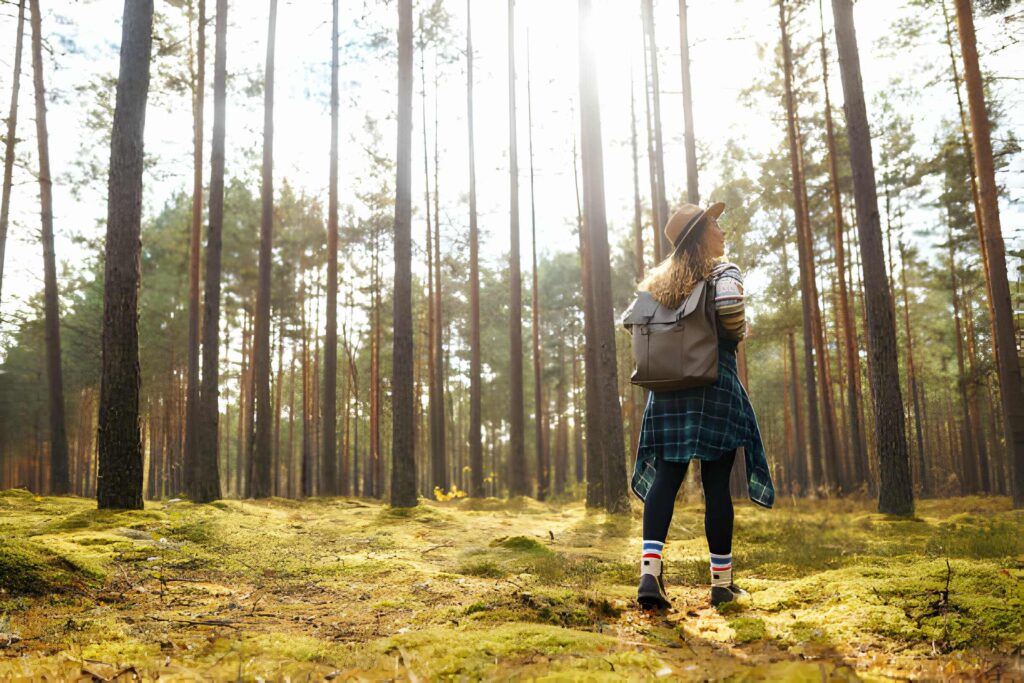Whether you are a seasoned outdoor enthusiast or just looking for a new way to stay fit, hiking is a wonderful way to connect with nature and reap the benefits of physical activity. Hiking is a popular outdoor activity that has numerous health benefits and allows you to explore new terrain and discover hidden gems in your local area. In this article, we will explore the benefits of hiking, including the physical and mental benefits, the connection to nature, and the sense of adventure and exploration that comes with hiking.
 Pin
Pin Table of Contents
Health Benefits of Hiking
One of the most obvious benefits of hiking is the physical activity it provides. Hiking can be a great way to improve your cardiovascular fitness, build muscle and bone strength, and improve overall physical health. Hiking on varied terrain can help to improve balance and flexibility, and the constant changing of elevation can provide a great workout for your legs and core. Hiking is a low-impact exercise, making it suitable for people of all ages and fitness levels, and it can be a great way to improve your overall fitness and well-being.
In addition to the physical benefits, hiking also provides mental health benefits. Spending time in nature has been shown to reduce stress, anxiety, and depression, and hiking can provide a sense of peace and tranquility that is often hard to find in our busy, modern lives. The fresh air and the sounds of nature can provide a welcome respite from the constant noise and distractions of our daily lives, and the simple act of walking can help to clear your mind and provide a sense of calm and relaxation.
Connection to Nature
One of the greatest benefits of hiking is the opportunity to connect with nature and immerse yourself in the great outdoors. Whether you are hiking through a forest, along a coastline, or up a mountain, you will have the opportunity to observe the natural world and appreciate the beauty and complexity of the natural environment. Hiking allows you to slow down and take in your surroundings, and it provides the perfect opportunity to disconnect from the hustle and bustle of urban life and reconnect with the natural world.
Hiking can also provide a sense of environmental stewardship and a greater appreciation for the natural world. By spending time in nature, you can develop a greater understanding of the importance of conservation and the need to protect our natural resources. Hiking through a pristine forest, along a crystal-clear river, or up a majestic mountain can be a powerful reminder of the importance of preserving these natural spaces for future generations to enjoy.
Adventure and Exploration
In addition to the physical and mental health benefits of hiking and the opportunity to connect with nature, hiking also provides a sense of adventure and exploration. Whether you are exploring a local trail or embarking on a multi-day backpacking trip, hiking allows you to experience the thrill of adventure and the satisfaction of exploring new terrain and discovering hidden gems in your local area.
Hiking can provide a sense of accomplishment and the opportunity to challenge yourself both physically and mentally. Whether you are conquering a challenging mountain peak or navigating a rugged trail, hiking can provide a sense of achievement and the opportunity to push your limits and test your abilities. Hiking can also provide a sense of freedom and independence, allowing you to chart your own course and explore the natural world at your own pace.
Sense of community and social connection among outdoor enthusiast
- Shared experiences: Hiking allows outdoor enthusiasts to connect with others who share a similar passion for being in nature, providing opportunities to bond over shared experiences and challenges on the trail.
- Group activities: Many hiking trails and outdoor areas host group hikes and events, providing a platform for outdoor enthusiasts to come together, meet new people, and build a sense of community.
- Networking and support: Hiking communities often offer a support system for outdoor enthusiasts, whether it’s through sharing tips and advice, or helping each other navigate through difficult terrain. These connections can lead to lasting friendships and a sense of belonging.
- Volunteer opportunities: Many hiking and outdoor organizations offer volunteer opportunities for trail maintenance and conservation efforts, bringing the community together to contribute to the preservation of natural spaces and build a sense of collective responsibility and stewardship.
- Social media and online communities: Social media platforms and online forums provide a space for outdoor enthusiasts to connect, share their experiences, and support each other, fostering a sense of community even outside of the physical outdoor spaces.
Hiking and spending time in nature can contribute to environmental conservation and appreciation for the natural world in several ways:
- Connection to the environment: Spending time in nature allows people to develop a deeper connection with the natural world. This connection can lead to a greater appreciation for the environment and a desire to protect and conserve it.
- Education: Hiking in natural areas provides opportunities for people to learn about the local flora, fauna, and ecosystems. This knowledge can foster a greater understanding of the importance of conservation and the impact of human activities on the environment.
- Awareness of environmental issues: Being in nature can make people more aware of the environmental issues affecting the area, such as pollution, deforestation, or habitat destruction. This awareness can lead to a desire to take action to protect and preserve these natural spaces.
- Support for conservation efforts: Spending time in nature can inspire individuals to support conservation organizations and participate in environmental initiatives, such as volunteering for trail maintenance, participating in community clean-up events, or donating to conservation causes.
- Promotion of sustainable practices: Hiking and spending time in nature can encourage individuals to adopt more sustainable practices in their daily lives, such as reducing waste, conserving water and energy, and supporting sustainable agriculture and businesses.
By immersing themselves in nature, people can develop a stronger connection to the environment and gain a greater appreciation for its beauty and importance, leading to a desire to protect and conserve it for future generations.
Regular hiking offers numerous physical fitness benefits, including:
- Cardiovascular endurance: Hiking uphill or on uneven terrain helps to improve cardiovascular endurance, leading to a stronger heart and increased lung capacity.
- Muscle strength and endurance: Hiking involves the use of the lower body muscles, including the quadriceps, hamstrings, glutes, and calves. It also engages the core muscles for stability and balance. Over time, this can lead to increased strength and endurance in these muscle groups.
- Bone density: Weight-bearing activities like hiking help to improve bone density, reducing the risk of osteoporosis and fractures.
- Weight management: Hiking can help with weight management and fat loss, as it is a calorie-burning activity.
- Mental health benefits: In addition to the physical benefits, regular hiking can also improve mental well-being by reducing stress, anxiety, and depression.
Compared to other forms of exercise, hiking offers a unique combination of cardiovascular, strength, and balance training. While activities like running and cycling are more focused on cardiovascular endurance, hiking incorporates varied terrain and inclines, which can provide a more holistic workout. Additionally, hiking allows individuals to connect with nature and enjoy the outdoors, adding an element of mental relaxation that may be lacking in other forms of exercise. However, it’s essential to find an exercise that suits individual preferences and goals, as any form of physical activity can offer positive effects on overall health and fitness.
Hiking Tips
- Start slow and gradually increase intensity: If you’re new to hiking, start with shorter, easier trails and gradually work your way up to longer, more challenging hikes.
- Invest in proper gear: Invest in a good pair of hiking shoes, a comfortable backpack, and appropriate clothing for the weather and terrain. Remember to also bring essential items like water, snacks, a first aid kit, and a map.
- Stay hydrated and fueled: Drink plenty of water before, during, and after your hike, and bring snacks to keep your energy levels up.
- Listen to your body: Take breaks when needed, and don’t push yourself too hard. Pay attention to any pain or discomfort, and seek medical attention if necessary.
- Focus on mindfulness: Use hiking as an opportunity to disconnect from technology and connect with nature. Practice being present in the moment and appreciating the beauty around you.
- Join a hiking group or find a hiking buddy: Hiking with others can provide motivation, safety, and a sense of community. It’s also a great way to meet like-minded individuals.
- Consider taking a hiking or wilderness first aid course: Being prepared for emergencies can help you feel more confident and safe while hiking.
- Check the weather and trail conditions: Before heading out, make sure to check the weather forecast and trail conditions. It’s important to be prepared for any changes in weather or trail difficulty.
- Leave no trace: Practice Leave No Trace principles by minimizing your impact on the environment, respecting wildlife, and properly disposing of waste.
- Set goals and track your progress: Whether it’s increasing your distance or conquering a challenging trail, setting goals can help you stay motivated and track your improvement over time.
Conclusion
Hiking is a wonderful way to connect with nature, improve your physical and mental health, and experience the thrill of adventure and exploration. Whether you are looking for a new way to stay fit, an opportunity to connect with the natural world, or a chance to explore new terrain, hiking has something to offer for everyone. So grab your hiking boots, pack a backpack, and hit the trails to experience the countless benefits of hiking for yourself.
FAQs
Hiking provides a great cardiovascular workout, improves muscle strength and endurance, enhances bone density, and helps lower the risk of heart disease.
Spending time in nature has been shown to reduce stress, anxiety, and depression. Hiking also offers a sense of tranquility and helps improve focus and cognitive abilities.
The essential gear for hiking includes proper footwear, a backpack, weather-appropriate clothing, water, snacks, a map or GPS, and a first aid kit.
Yes, there are hiking trails suited for beginners, intermediate, and advanced hikers. It’s important to research and choose a trail that matches your fitness level and experience.
It’s important to hike with a buddy, tell someone your hiking plans, stay on marked trails, be aware of wildlife, carry a whistle for emergencies, and check the weather forecast before heading out.
By choosing to hike in natural areas, you can support conservation efforts, raise awareness about the importance of preserving natural landscapes, and promote environmentally-friendly practices.
Hiking provides opportunities to connect with others, whether it’s with friends, family, or organized hiking groups. It can also be a great way to meet new people and build a sense of community.
Hiking can contribute to weight loss and fitness goals by burning calories, increasing muscle strength, and improving overall endurance. It’s a fun and effective way to stay active and pursue a healthy lifestyle.
Hiking allows you to explore new terrain, discover hidden natural wonders, and experience the thrill of overcoming physical challenges. It’s a way to satisfy your sense of adventure and curiosity.
Consistently hiking can lead to improved overall health, increased appreciation for nature, stronger social connections, and a greater sense of well-being. It’s a sustainable way to maintain a healthy and balanced lifestyle.



























